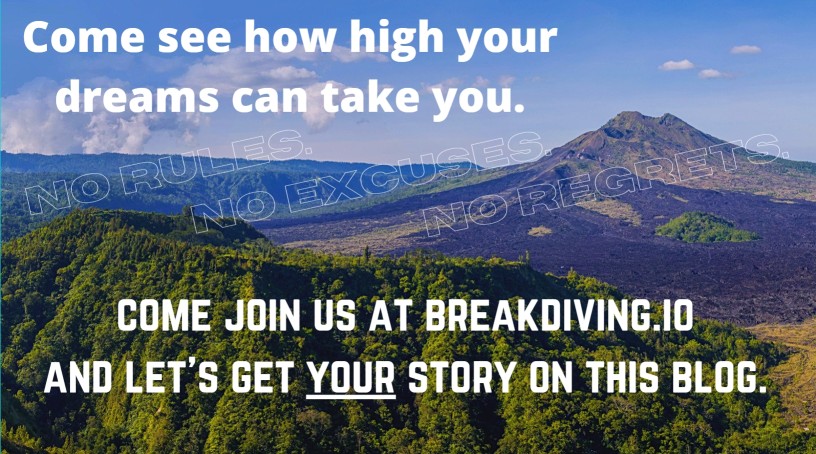
Reflections on My Journey as a Writer: Insights, Challenges, and Advice
Dive: Artist - Writer (Non-Fiction)
Description: Writes non-fiction books
Level: Level 1
Level Requirements: Has written any type of non-fiction (not poetry)
Certified On:
Apr 3, 2025
Editor’s Note: On all dive certifications, we try to edit the writing as little as possible to preserve authenticity, personality, and writing style. We typically fix spelling errors, but minimally modify grammar and sentence structure (just enough to ensure readability).

Name: Bitrus Bulus Boje Break Diving Level: Recruit Number of Certified Dives: 0 From: Nigeria In: Nigeria
1. When and Why Did You Decide to Pursue This Dive At This Level? What was your inspiration and motivation?
I chose to pursue this path as a non-fiction writer to establish myself as an artist whose work could be justifiably assessed by professionals, with the aim of becoming a writer who adds meaningful value to humanity.
2. How Long Did It Take For You To Accomplish This Dive At This Level From The Day You Decided To Pursue It, And Why Did It Take That Long?
3. What Was The Hardest Part About Achieving This Particular Dive Level?
4. What Was The Easiest Part About Achieving This Particular Dive Level?
5. What Is Your Advice For Someone Who Is Pursuing This Dive And Level?
6. What Are Some Of The Best Resources You Recommend to Those Pursuing This Dive At This Level, And Why Do You Recommend Them? Please Include Relevant Weblinks, If Applicable.
Resource 1: William Martin: Don’t Worry About Publication, Praise, or Productivity - Writer's Digest is a one-stop resource for writers, providing expert advice, tools, and a supportive community.
Resource 2: The Writer - The Writer is a comprehensive resource for writers of all genres, offering articles, inspiration, writing prompts, contests.
7. Tell Us A Story Of One Of Your Adventures While Pursuing This Dive (At This Level).
8. What Evidence Did You Submit to Prove You Met the Requirements for This Dive and Level?
Guiding Lights in a Digital Landscape: The Importance of Timeless Teachings in Modern Times:
Leaders, educators, and mentors have a crucial role to play in ensuring that their teachings resonate with today’s generation. It's not enough to simply pass on information. In an age where distractions are abundant, it is essential to make core teachings relevant and applicable, offering practical solutions to real-life issues. By doing so, we can guide young people in making thoughtful, ethical decisions that promote values such as empathy, integrity, and perseverance.
Without this relevance, the younger generation may begin to view teachings as mere rituals or outdated practices, rather than as a valuable guide for navigating life. They may miss the deeper message that these teachings are meant to help individuals understand their purpose, their place in the world, and their connections to others.
As mentors and educators, we must recognize that young people are not only searching for answers but for meaning. They are looking for guidance that speaks to their lives, challenges their thinking, and offers hope for the future. If we fail to provide this, we risk losing them to a world that promises quick fixes but often fails to deliver lasting fulfillment.
To navigate today’s world, young people need more than just knowledge; they need to unlock their inner potential. This requires critical thinking and introspection—skills that allow individuals to discover their true purpose and understand their place in the world. Encouraging these skills is essential for personal growth and success in any field.
In the world of technology, critical thinking, cognitive reasoning, and problem-solving are the core pillars that drive innovation. These abilities are central to creating effective solutions and making meaningful contributions to the tech world. Contributing to technological advancement requires the ability to think critically, reason logically, and solve complex problems, empowering individuals to approach challenges with creativity, clarity, and impact.
Alongside these core skills, other vital pillars complement the development of technological expertise. Creativity and innovation are essential for pushing boundaries and coming up with new ideas. Adaptability and continuous learning are key in an ever-changing technological landscape, allowing individuals to stay relevant and responsive to new challenges. Collaboration and teamwork are indispensable, as technology often involves interdisciplinary efforts that bring together diverse perspectives to create better solutions. Technical proficiency is important to apply knowledge and tools effectively, while communication skills are necessary to express ideas clearly and work effectively with others. Finally, resilience and perseverance are essential for overcoming setbacks and refining solutions, helping individuals grow through challenges.
Let us work together to ensure that the teachings we pass on to future generations—whether rooted in tradition, philosophy, or modern principles—serve as relevant, empowering tools. By integrating these core pillars—critical thinking, creativity, adaptability, collaboration, technical proficiency, and resilience—young people can navigate both the challenges of the world and their own personal journeys. This will help them harness their inner potential and make meaningful contributions to society and the world at large.
Faith in Flux: Navigating the Intersection of Religion and Modernity:
This shift is also clear in technology, which focuses on creating solutions for real challenges. Modern teaching methods, like problem-solving and critical thinking, aim to help younger generations build digital skills and think creatively.
However, this change also affects religion, which may lose its importance if it doesn’t adapt to today’s fast-changing world. Religious teachings need to focus on practical and relatable lessons that connect with modern life.
If religious leaders don’t practice what they preach or rely too much on stories of miracles, they may lose the trust of a generation that values proof and honesty. To stay meaningful, religion must connect with the curious and tech-savvy minds of younger people, offering lessons that are both relevant and thoughtful.
Transition from Analog to Digital Generation:
It is disheartening to witness the folly of humanity, driven by its hypocritical nature, where individuals struggle to be sincere with themselves. In their misguided efforts to solve existing challenges, they often create even more problems for future generations. Many people spend countless hours debating issues they know to be flawed, mistakenly believing that such discussions signify intelligence. In doing so, they fail to recognize that they are complicating matters for those who will come after them.
The present generation is pivotal in driving technological advancements that address many inherited problems, thus fostering a better environment for future generations. Yet, due to the intricate nature of humanity, individuals frequently resist embracing what could clearly be the ultimate solution to long-standing issues, opting instead to engage in discussions that lead nowhere.
As the Bible states, “God created man plain and simple, but man made himself very complex.” This complexity is a product of human actions, as it is indeed humanity that holds the keys to the problems it has created. This suggests that there is no problem that cannot be solved, provided it originates from human activity.
Over the years, humanity has generated numerous self-imposed problems, often deflecting blame onto others for its predicaments. These issues have frequently arisen without adequate foresight regarding their potential consequences; some have been created intentionally, while others resulted from a lack of understanding of their implications. For humanity to effectively find solutions to its challenges, individuals must first accept responsibility for the problems they have created.
Within each person lies the potential to address the issues that surround them, yet this potential often remains untapped due to a lack of awareness of their capabilities. This ignorance creates opportunities for others who harness their creativity to tackle these challenges. As long as problems persist, they present opportunities that can lead to livelihoods; people become jobless only when they neglect to utilize their creative abilities to identify existing challenges, which can, in turn, lead to opportunities.
As society grows more complex—largely due to human intricacies—opportunities are available primarily to those who are sincere and committed to finding solutions. Success is less about who you know and more about what you know. Society increasingly values individuals who can provide solutions. The demand for creative skills is a key driver of opportunity. Therefore, humanity must leverage its inherent creative abilities and skills to solve these compounded problems.
9. Will You Be Pursuing The Next Level For This Dive? If Yes, Why? If Not, Why Not?
10. What is the Break Diver's Creed?
Certificate photo:
And having made this post, and provided adequate evidence to the dive committee, Bitrus Bulus Boje is now hereby certified by Break Diving, Inc. as: Artist - Writer (Non-Fiction) - Level 1. Congratulations ! Thank you for being an inspiration to others!
Certificate number: 442
The author above wrote this WYSEguidance post as one of the certification requirements to become certified by Break Diving, Inc. for a dive completed. Would you also like to find greater success, happiness, and friendship, and make genuine supportive connections with others around the world pursuing your same dreams? Come join us at Break Diving and soon your story will be the next one you read about on this site!
